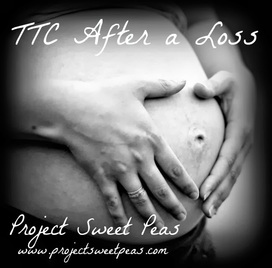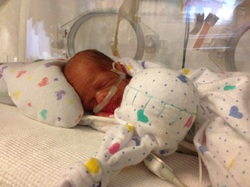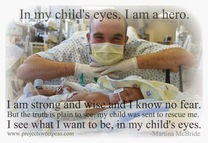 Having a child in the NICU brings with it so many emotions and realities, and often times one of the most stressful ones has to do with medical insurance. It won’t be long before the bills and phone calls start pouring in, and this is of course the last thing any new parent has time or energy to deal with. But sooner or later you will have to deal with it, and it’s better to be prepared when that time comes. Here are some tips that might be helpful for you as you begin that bureaucratic journey:
Hang in there. No one likes dealing with paperwork and forms. If this is a task that can be delegated, perhaps to a spouse, do so. Insurance paperwork is time-consuming and draining, but it is usually short lived.  There is no greater tragedy for a parent than losing a child. It is the loss of a dream and the vision of a perfect family. When the dream ends, the need/hunger to be pregnant again is overwhelming, and sometimes all consuming … not to replace the baby who was lost, but to fill an aching void … with the hope of finding peace and purpose. According to Dr. John Sussman, co-author of Trying Again: A Guide to Pregnancy After Miscarriage, Stillbirth and Infant Loss (Taylor Publications), a woman’s wait to get pregnant again really depends on the nature of the loss. Although medical professionals offer varying time frames – which could be anywhere from three months to a year, Sussman and others advise waiting until menstrual periods have returned, blood counts have normalized and that the doctor has given their approval. Medically speaking – this advice makes perfect sense – waiting until the body heals from this unspeakable tragedy. Emotionally, though, the burning desire to have that full-term healthy baby in our arms leads us angel moms to a near obsession with getting pregnant again – and quickly. “Our OB came to see us the morning after our daughter was born, and my question after what I was to do about my engorged boobs was when could we try again,” said Lauren Wilson of Hawaii, whose daughter was born at 30 weeks, 6 days because of preterm labor. “The drive was so intense. Every cell in my body knew it was supposed to be caring for a baby. My entire being needed to hold and care for a baby – that I couldn't physically (do this) felt wrong to the core. I thought having another baby would at least make my life feel more back on track.” Stacy Schulz of Oklahoma lost her twin daughters, Emilyn and Hailey, at 20 weeks, 5 days. Although her doctor recommended a two-month wait post loss, she and her husband wanted to try again as soon as possible – after being diagnosed with polycystic ovarian syndrome (PCOS) while trying to conceive her daughters and needing Clomid to conceive after 18 months of trying, she knew it would probably take awhile. Wilson’s doctor also recommended the same length of time before trying again, but he also he told them that emotionally, no one could determine when they’d truly be ready but them. Time Therapy: Healing the Wounded Heart and Body When a pregnancy is lost, angel parents find themselves on a roller coaster of emotions that span the depths of anger, depression and deep sadness. Some want to begin trying again immediately, as Wilson and Schulz did, while others want a break to grieve and focus on other things. Although the next steps are truly personal decisions, the heart, mind and body need adequate time to heal. Wilson thought she was ready right away. She wanted so badly to be pregnant again. But her body and mind said otherwise. “I had in my mind that I needed to be pregnant by her expected due date (EDD),” she said. “My husband and I joked that we just looked at each other and conceived our daughter. But with her sibling – it was not so easy. My cycles never returned to normal without medication and shots. It felt like insult to injury. At the time, I hated that time … waiting and wondering. It was emotional – a roller coaster. When my EDD passed, and then months and months more – I felt lost. However, in hindsight, I wish we hadn't begun trying so soon, especially with the secondary infertility diagnosis. When we ultimately did get pregnant again a few days after our daughter’s first birthday, I realized how thankful I was that I had that time to be a mom to her. I was able to do so much in her honor that year. It was our special time.” For Lindsay Vazquez of Arizona, a mom to two preemie sons and an angel son, healing from her loss three and one-half years ago was – and still is – a sometimes all-encompassing mind/body exercise. Her angel Naethyn was born at 30 weeks because of placental abruption coupled with a blood clot, undiagnosed preeclampsia, as well as an incompetent OB, who, Vazquez said, ignored her concerns of severe swelling just weeks prior to Naethyn’s passing. “When I got pregnant with Naethyn, the deal was – three and done. But I never imagined my life without my baby. In the delivery room, alone, I chose to have a tubal ligation – one that was never meant to be a temporary birth control fix. I didn't even have time to discuss it with my husband. I lost 60 percent of my blood that night and there was no time to consider anything else. I think my OB wanted to do everything she could so she respected my decision to have the procedure. I was not in the right frame of mind to be making those life-altering choices then – and I even had second thoughts as I was wheeled into the OR and the mask was being placed over my face. A part of me hoped to not wake up.” Once Vazquez and her husband emerged from the initial stages of grief, they began investigating another pregnancy – either through IVF or surrogacy – desperate, she says, to right the wrong that she was feeling. But with her physical pregnancy history and the cost to reverse a tubal ligation, the chance to fill her arms with another child may be a distant dream. Until then, she continues the healing process of taking care of herself physically and never giving up the hope of welcoming another miracle. “We've been living without our angel for three and a half years. It’s been very difficult, but we are doing it,” she said. “I have not accepted the choice I made that horrible night, and I know it will take a miracle to achieve the miracle we so desperately want. It's strange, but after going through something like that, I think it either makes you or breaks you. I'm a fighter and so are my kiddos. We would just like the opportunity to have a chance again. I'm not sure whose hands we'll be in, but one has to believe.” Managing Post-Loss Pregnancy Fears Achieving pregnancy after a loss is nerve-wracking. There are no naive, happy thoughts – an angel mom is wise to the world. Seeing double pink lines or a plus sign on a pregnancy test does not mean a full-term, healthy baby. One of the best first steps is connecting with a maternal fetal medicine (MFM) doctor who can review your history and then set a plan for this pregnancy – one that clearly spells out such things as testing, shots to prevent pre-term labor, ultrasounds – when and how often, as well as accounts for the pregnant mom’s worries along the way. “My MFM allowed me to be seen weekly from my loss date until I reached viability to assure me that everything was OK,” said Schulz. “As soon as I found out I was having a boy, I went and bought a blanket for him. Not to wrap him in when he was a newborn, but to wrap him in so I would have something special just in case he came early and died too. I didn't want to have nothing special like with the girls. I was scared up until the end. I just took it one day at a time, and kept track of his chances for each gestation, breathing a little sigh of relief with each week that passed.” Wilson handpicked her doctors for the best chance at success. “I went into my subsequent pregnancy 110 percent sure that everything that caused my daughter to come early was a fluke. It had to be; what risk factors did we have for anything? That being said, I still rounded up the best team of doctors that I could find and that I trusted completely. Knowing that I had people I could call and who knew our story made a huge difference. I didn't have to worry about feeling like a burden calling or emailing with my questions or concerns. I also knew that I needed to find peace, and have a peaceful delivery, so I saw a psychologist who specialized in medical trauma. This made a world of difference to me. “I was caught completely off guard when we ran into complications with our subsequent pregnancy, but having set up such a great support system with our team of doctors, family and friends who had already navigated a subsequent pregnancy – I felt safe.” A Post-Script: the Rainbow Babies "And when it rains on your parade, look up rather than down. Without the rain, there would be no rainbow." – G.K. Chesterton, English writer/philosopher Wilson and Schulz both achieved their dreams of a rainbow baby. Wilson and her husband welcomed a son in February 2010 and a little sister in July 2012. Schulz’ son, Elim Henry-Otto, was born full-term in February 2011. She and her husband hope to begin working on another little sibling later this year. [i] http://www.pregnancyandbaby.com/pregnancy/articles/939871/conception-after-loss-when-should-you-try-to-get-pregnant-again  For most of us, memories of when we were young always include a certain song sung by a certain special someone. That song resonates with us, and will forever. That particular song reminds us of calm, peace, serenity, comfort and security. It’s no secret that music can create its very own atmosphere. Therefore, it’s no surprise to find live music easing its way into NICUs across the country. The American Music Therapy Association lists many reasons for having music in the NICU. There are the obvious reasons, such as: Music can mask all the ambient noise in the NICU environment that all NICU parents know so well. Music can enhance the NICU environment for personnel and keep the NICU nurses more stress-free. Then there are the not-so-obvious reasons:
Many hospitals have volunteers playing guitar and singing to the baby while the caregiver holds the baby (when possible). However, preemies.about.com suggests waiting until the baby is ready for music therapy to be sure the baby is not over stimulated. Music therapy is not just for the baby, it’s also for the caregivers. One mother turned her NICU stay into something wonderful for other NICU families. She decided while in the NICU with her son (born 6 weeks premature) to use her gift of voice to start Healing Music Circles. She says “A Healing Music Circle creates a space where you can find a bit of peace wherever you are and be part of a community that is going through the same experience…When going through traumatic times, we often close our hearts because of our sadness, anger or overwhelm.” Amy wants to aid families through the NICU experience. Currently she has Healing Music Circles for those in the NICU, and Healing Music Circles for the loss of a child: amyrobbinsonwilson.com/blog/  When parents lose a child – no matter what age, friends and family want to know how they can best help the grief-stricken. Some offer homemade meals, an ear to listen or shoulder to cry on, or make a donation to an organization in the child’s memory. Although none of these gestures can ever bring the beloved child back to its family, the gestures show love and a commitment to keeping the child’s life/memory alive. One of the most touching gestures for Theresa Gill Wellman, a Project Sweet Peas project leader who lost her son Donny after six days as the result of a rare birth defect (congenital diaphragmatic hernia), was a garden that a friend offered to plant in Donny’s memory. Wellman spent that spring with her friend on this labor of love – watering the flowers, meditating beside it and contemplating how she would best navigate life without her son. “I’ve been comforted by this simple gesture – and by the knowledge that my son had touched others’ hearts,” Wellman said. Wellman then decided to plant a memory garden at her own house – something that she could cultivate and nurture as often as she wanted. Although she and her family no longer live there, she hopes to establish one again soon at her next permanent residence. “A memorial garden is very therapeutic because it helps establish a connection to your child,” she said. “It is so hard to learn how to parent your angel. The garden provides a gateway; it provides a pathway for grief and healing. It gives a newly grieving parent something to do that is directly related to their child.” PSP writing volunteer Erin Hart is also a proponent of remembrance plantings. After her twin sons Ethan Patrick and Casey Lawrence passed after being born prematurely at 22w5d gestation, she received two blue hydrangeas that she promptly planted. A family member also purchased plants of her choosing (two hibiscus) that she potted the same day she received them. The gestures were touching – giving life when lives were lost. But the most healing activity was planting her own memory garden – one that, coincidentally, surrounds a tree with twin trunks, something she didn’t notice until a co-worker pointed it out in a picture Hart had taken. “I needed something outside of the cemetery – a beautiful place where I could sit, think and talk to my sons. Each spring when I’m planting the garden, I feel their presence. When I’m digging the holes for their gerbera daisies and the windchime above me tinkles in the breeze, I know they are with me. It is one of the very few things I can still do for them, and I imagine they are giddy with excitement to know how much love I pour into this.” Not everyone has a green thumb for memory plantings they do themselves, so they or their loved ones may opt to purchase a plant or a tree in the child’s name. When Shannon Mason, PSP’s bereavement and writing director, lost her babies, her aunt and uncle dedicated a magnolia tree along a highway in Mississippi under the Keep Mississippi Beautiful “Avenue of the Magnolias” program. According to the program website, a $25 contribution will dedicate a specific newly planted tree in honor or memory of your designee.1 There are many other similar organizations that allow families to purchase or dedicate plantings:
Plants will never replace our precious angels, but they offer a way for family and friends to stay connected to the grieving family – and honor the life of a child who was taken much too soon. “Even though my son died, his spirit lives on,” Wellman said. “When I plant these flowers, water them and take care of them – I think of how Donny continues to live. When I watch the flowers grow and bloom, I can feel his love growing and blooming within my heart. Nature is one of my connections with Donny – and it is through nature and spending time within it that he communicates with me, and I can be a mommy to my angel.” For more sweet updates and stories, subscribe to our newsletter Sources 1 http://www.mdac.state.ms.us/programs/keep_ms_beautiful/keep-mississippi-beautiful-magnolias.htm 2http://www.rowantreefoundation.org/2012/02/465/ 3http://www.treegivers.com/index-m.html 4http://www.thecomfortcompany.net/memorial-sympathy-gift-trees.aspx  Dads have such an important role in the NICU, but at times it can seem as if your role is secondary, as everyone around focuses on Mom and her recovery, needs, and emotions. Don't let this discourage you. Your role and support is vital to your child's wellbeing. You may find yourself feeling helpless and at a loss as to what to do. Strong and often contradictory emotions, such as anger and sadness, guilt and grief, helplessness and hope may be swirling through your head throughout the day. Stop and take a moment to acknowledge what you are feeling and just how difficult your situation is. Here are a couple great tips of how to take care of yourself, spouse or partner and your baby. Helping Yourself See if your NICU has a support group and consider attending. Most people you know have never experienced the NICU and they just can't relate to everything you are going through. Talking with others who are in the same situation as you can be very helpful. Be open and honest about your concerns and fears. If a support group isn't available, seek out a trusted friend or family member you can talk to. Exercise can be a good way to release some tension and clear your head. Don’t forget to get enough sleep, and eat as well. Your health is important too. Helping your Baby Looking at your new baby hooked up to machines, looking so small and frail… this is not what you imagined fatherhood to be like. You may be extremely nervous about holding your baby, and participating in his/her care for fear of doing something wrong. Pay close attention to what the nurses are doing and ask lots of questions so you can feel confident about helping. They know that all parents are nervous about what to do, so no question will surprise them. Take notes if you need to or have them stay right there with you the first few times until you feel comfortable. The most important thing is not to let these opportunities pass you by. You will want to experience and remember these special moments. Helping your Spouse or Partner You may find yourself wondering just how Mom is able to handle everything--and the secret is, she can't without a lot of help. Make sure you are helping take care of her so she is able to focus on your child as well. Some things that may help:
Having a child in the NICU may be the hardest thing you ever face in your life, so now is not the time to play the hero and pretend you can do it all. Focus on what you can do to help your baby, and your spouse or partner and most importantly, yourself. |
ArchivesCategories |
|
Project Sweet Peas is a registered 501(c)3 nonprofit organization incorporated in the state of Pennsylvania. FEIN # 273679594
Related Websites: www.nicuawareness.org |
